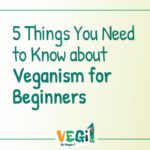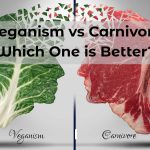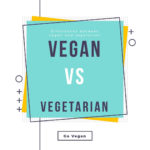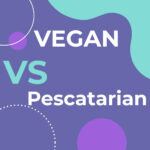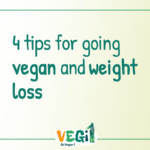What Happens If a Vegan Accidentally Eats Meat?
Essential guide for conscientious vegans. Learn how to cope with accidental meat-eating
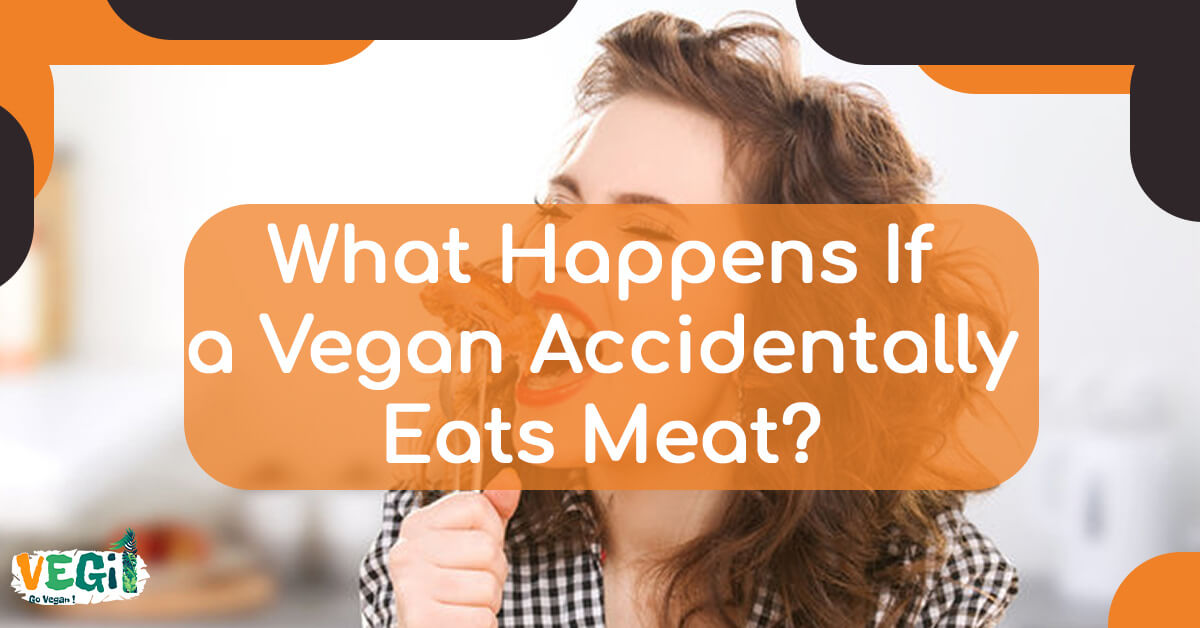
As someone who has embraced a lifelong vegetarian lifestyle and transitioned into a committed vegan for nearly a decade, I understand the profound impact that accidental meat consumption can have on one’s emotions and ethical convictions.
The experience of unknowingly ingesting animal products can trigger feelings of sickness, guilt, and disconnection from our core values.
Despite encountering dismissive attitudes from others who may perceive such incidents as inconsequential, these moments hold significant weight and require thoughtful consideration.
In this essay titled “What Happens If a Vegan Accidentally Eats Meat?” I will explore scenarios where such accidental consumption can occur, delve into potential responses, and emphasize the importance of self-compassion and understanding within the vegan community.
In this article you will read:
Unsettling reactions to accidental meat consumption
Being a lifelong vegetarian and a dedicated vegan for almost a decade, I can attest to the profound emotional impact of accidentally consuming meat.
Each time such an incident occurs, a wave of unsettling emotions engulfs me, leaving me both physically sick and emotionally upset.
The experience strikes at the core of my identity as a compassionate vegan, and it can be challenging to process the mixed feelings that arise in such moments.
Dealing with the physical & emotional aftermath
When I realize I’ve unintentionally consumed animal products, sickness washes over me.
My body, accustomed to plant-based nourishment, reacts strongly to foreign substances. I may experience nausea, stomach discomfort, or even headaches.
It reminds me of the stark difference between the foods I have consciously chosen to exclude from my diet and the accidental intrusion of non-vegan ingredients.
Beyond the physical discomfort, the emotional aftermath is equally overwhelming.
I feel profoundly disappointed in myself for inadvertently straying from my vegan principles.
A feeling of powerlessness compounds this guilt, as if I have betrayed my values and the animals I advocate for.
It’s essential, however, to recognize that we are all human, and nobody is perfect.
Accidental meat consumption does not diminish the overall impact of my commitment to veganism. Still, it does serve as a powerful reminder to be more vigilant and mindful of my food choices.
Navigating ethical dilemmas
As a compassionate vegan, the ethical implications of accidentally consuming meat are substantial.
I wrestle with the knowledge that my careless actions may contribute to the demand for animal products, perpetuating the suffering of animals in the industry.
This internal struggle with guilt can be emotionally draining as I confront the dissonance between my values and the unintended consequences of my actions.
Navigating these ethical dilemmas requires introspection and self-compassion.
It is essential to remember that veganism is not about perfection but the intention to live compassionately and ethically.
Acknowledging my feelings of guilt and utilizing them as motivation to reinforce my commitment to veganism is a crucial step in navigating this emotional terrain.
Moreover, engaging in open conversations with fellow vegans and supportive communities has proven immensely helpful.
Sharing my experiences with others who understand the challenges of accidental meat consumption provides solace and helps me process my emotions.
It also allows me to learn from their experiences and discover effective strategies for avoiding such situations in the future.
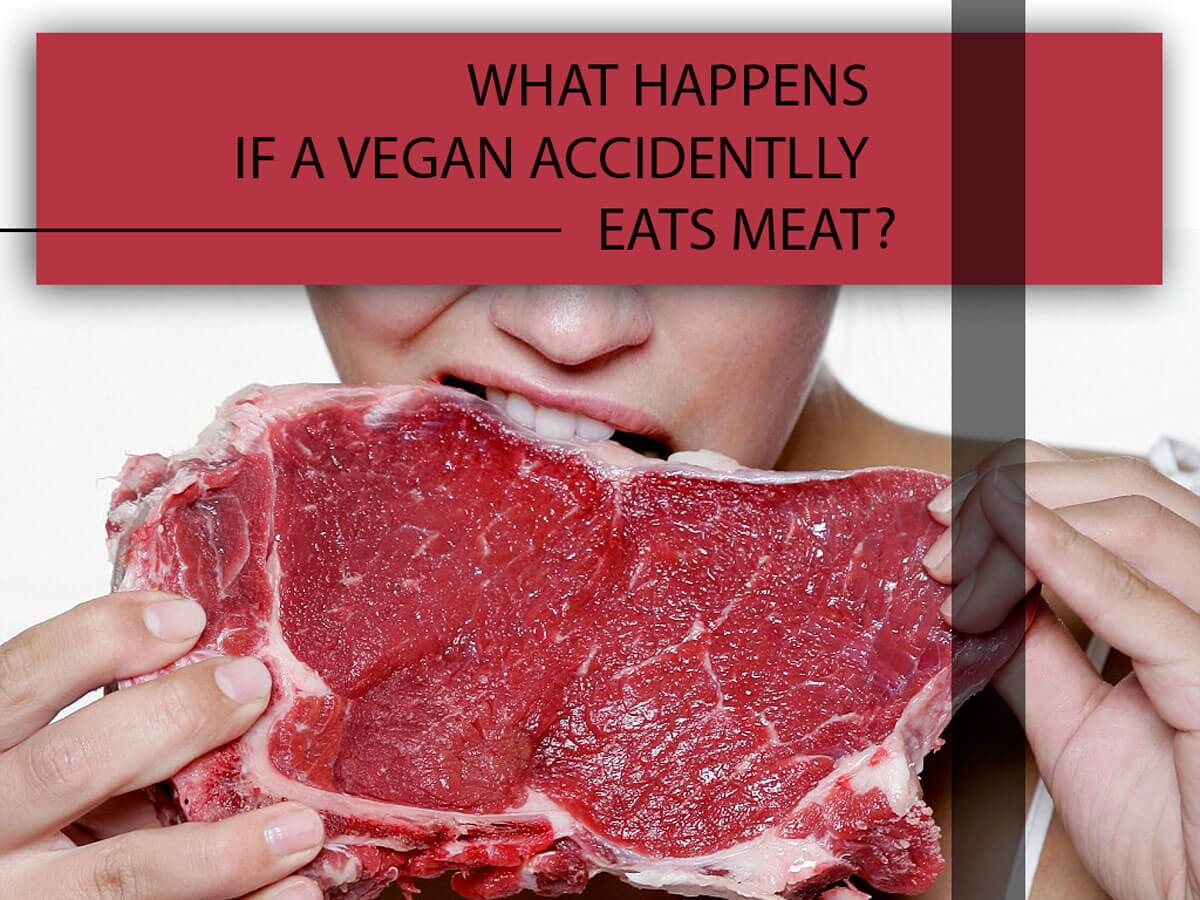
Accidental meat consumption in various settings
As a lifelong vegetarian turned dedicated vegan, I have encountered numerous scenarios where accidental meat consumption can occur.
Each setting presents unique challenges, and navigating these situations with grace and resilience has become integral to my vegan journey.
Let’s explore four distinct scenarios and my strategies for coping with accidental meat consumption.
-
Dining out
Dining out as a vegan has come a long way, with an increasing number of restaurants offering plant-based options.
However, mistakes can still happen, and inadvertently consuming non-vegan ingredients can be disheartening.
When this occurs, I must remain calm and approach the situation empathetically.
If I realize that what I’ve been served is not vegan, I stop eating immediately and consider my response carefully.
A polite and understanding conversation with the restaurant staff can significantly impact.
I share my concerns about the accidental inclusion of animal products and offer suggestions on how they can improve their plant-based options.
This approach helps me reclaim my vegan values and empowers the restaurant to be more considerate of vegan customers in the future.
-
Being a guest
As a guest in someone’s home, I understand the delicate balance between maintaining my vegan principles and being considerate of my host’s hospitality.
If I don’t know the host well or if there are complex social dynamics at play, I may stop eating and say nothing to avoid making the situation uncomfortable.
Recently, at a friend’s house, they ordered a takeaway for our gathering, inadvertently including eggs in my dish.
Rather than causing a scene, I quietly pushed my main aside and focused on enjoying the vegan-friendly shared bits.
In this instance, prioritizing my friend’s feelings over mine allowed us to have a wonderful time together without unnecessary tension.
-
Takeaways
With the rise of online food delivery services, ordering takeaways has become more accessible for vegans. However, mistakes can occur even with the convenience of filtering for vegan options.
When I receive an order that is not vegan, I find it essential to express my concerns while being mindful of the feelings of the restaurant staff.
Complaining with kindness and understanding can be more effective than reacting with anger.
By providing constructive feedback, I encourage the restaurant to improve its understanding of veganism and avoid similar errors in the future.
I also appreciate the opportunity to educate the staff about the importance of veganism and its impact on animals, the environment, and health.
-
Special events
Special events, such as work dinners or weddings, can be challenging for vegans, as social etiquette and cultural norms often dictate the menu.
When presented with a meal that includes non-vegan items, I assess the context and my relationship with the hosts before deciding on the best course of action.
If someone else is paying or if I’m representing my workplace, I may choose to continue eating, focusing on the connections and experiences rather than the food.
At such events, being a positive and open-minded ambassador for veganism can have a more significant impact in the long run.
However, if the situation allows, I kindly inquire about plant-based options or inform the hosts about my dietary preferences in advance.
Doing so increases the chances of being accommodated and reduces the likelihood of accidental consumption.

How vegans may handle accidental meat consumption
As a dedicated vegan, encountering accidental meat consumption can be a challenging and emotional experience.
How I respond to these situations can vary depending on the context, the people involved, and the level of impact on my vegan values.
Over time, I have developed different approaches to navigating such incidents, aiming to influence positive change, foster understanding, and maintain a sense of compassion.
1. Complaining with grace
I respond with grace and understanding when faced with accidental meat consumption at a restaurant.
My objective is not to place blame or create conflict but to provide constructive feedback that can lead to positive change.
A polite and respectful conversation with the restaurant staff allows me to express my concerns about the mix-up and advocate for improved plant-based options.
Instead of expressing frustration or anger, I educate the staff about veganism and its principles.
By sharing my perspective, I want to raise awareness and encourage restaurants to be more considerate of their vegan customers.
It’s rewarding to witness the positive impact of these conversations as some restaurants have since improved their understanding of veganism and expanded their vegan menu options.
2. Knowing when to stay silent
In certain situations, such as being a guest at someone’s home or attending a social event, I may choose to stay silent about an accidental consumption of non-vegan ingredients.
While it can be disheartening, I consider the feelings of my hosts and the social dynamics at play.
If the situation is not conducive to addressing the issue without causing discomfort or tension, I gracefully navigate the meal without fussing.
My focus shifts from the food to the company and the meaningful connections I share with others.
I find that emphasizing understanding and consideration in these instances allows me to foster positive relationships while being true to my vegan principles in other aspects of my life.
3. The aftermath
The realization of accidentally consuming meat after eating can be emotionally distressing.
In such moments, I remind myself that veganism is about intention, not perfection.
While I may feel disappointed and guilty, I acknowledge that slip-ups happen, and I am human. I choose not to dwell on self-criticism but instead use the experience as a learning opportunity.
I become more resilient in my vegan journey by processing my emotions and accepting my imperfections.
The aftermath of accidental consumption reminds me to be more vigilant in checking ingredients and communicating my dietary preferences.
Cultivating self-compassion is crucial, and avoiding allowing these incidents to undermine my commitment to veganism.
Reinforcing commitment & self-forgiveness
As a long-time vegan, I have embraced the essence of veganism: intention over perfection.
The journey towards a compassionate lifestyle is not about flawless execution but rather the unwavering commitment to minimize harm to animals and the planet.
Understanding this fundamental aspect of veganism has allowed me to reinforce my dedication and practice self-forgiveness when faced with accidental meat consumption.
-
Emphasizing intent over unintentional mistakes
Vegan values center around conscious choices that reflect compassion for all living beings.
While accidental slip-ups can be disheartening, we must remember that our commitment to veganism lies in our intentions.
Veganism is not a rigid set of rules to abide by but rather a way of life driven by empathy and ethical principles.
When confronted with unintentional mistakes, I strive to be kind to myself and acknowledge that being human means making errors.
Instead of dwelling on the slip-up, I focus on how my overall lifestyle aligns with my dedication to creating a more compassionate world.
Advocating for veganism beyond accidental slips
Veganism extends far beyond the occasional accidental consumption of non-vegan ingredients.
It is a powerful movement that ripples through society, affecting animals, the environment, and human well-being.
My compassionate choices profoundly impact these interconnected elements, reinforcing my commitment to veganism beyond accidental slip-ups.
Every day, I advocate for veganism by living as an example of compassion and sustainability.
The positive effects of my plant-based diet extend to the well-being of animals, the reduction of my ecological footprint, and the promotion of a healthier lifestyle.
By embodying the values of veganism and actively engaging in conversations about its benefits, I create a lasting influence that reaches far beyond my personal choices.
Real-life experiences: What happens when a vegan accidentally eats meat
Accidental meat consumption is a situation that many dedicated vegans, including myself, may face at some point on their journey.
Despite our best efforts to uphold a plant-based lifestyle, life’s unpredictability and human fallibility can lead to unintentional slip-ups.
The emotional impact of such incidents can be profound, and each experience reminds us of the delicate balance between intention and perfection in our commitment to veganism.
I vividly remember a particular dining-out experience where I ordered what seemed to be a vegan dish at a restaurant known for its plant-based options.
As I indulged in the meal, a sinking feeling washed over me when I discovered the presence of hidden non-vegan ingredients.
My heart sank, and a wave of disappointment and frustration engulfed me. I felt a deep sense of betrayal, not just to myself but to the animals and the planet I advocate for through my vegan choices.
In the aftermath of this accidental consumption, I found solace in the support of fellow vegans who understood the complexity of my emotions.
Talking openly about the experience and the emotional impact of it with like-minded individuals helped me process my feelings and find reassurance that I was not alone in my journey.
The understanding and empathy I received from my vegan community encouraged me to be gentle with myself and reinforced the notion that veganism is about progress, not perfection.
Another incident occurred when I attended a family gathering, and a well-meaning relative prepared a dish they believed to be vegan-friendly. Unfortunately, it contained hidden animal-derived ingredients.
At that moment, I faced a delicate balancing act of respecting my host’s efforts while staying true to my vegan values.
I focused on the joy of spending time with loved ones and politely declined the dish, expressing gratitude for their consideration.
Although my heart felt heavy, I recognized that navigating such situations required tact and understanding, as our choices can influence the perception of veganism by others.
In the wake of these experiences, I have grown more resilient and compassionate towards myself and others.
The occasional accidental meat consumption does not define my commitment to veganism; instead, it reminds me of the importance of continual learning and mindfulness in my food choices.
I have learned to embrace self-forgiveness and self-compassion, recognizing that being human means making mistakes.
These incidents have also empowered me to engage in more open conversations about veganism, raising awareness about its principles and inspiring others to make conscious and compassionate choices.
Here are some tips on how to stay clear of meat and broth as a vegan:
- Read Labels: When grocery shopping, always take a moment to read the ingredient labels carefully. Watch for animal-derived ingredients like meat, chicken, beef, pork, and broth. Sometimes, broth might be listed as “animal broth” or “chicken stock,” so stay vigilant.
- Be Wary of Sneaky Ingredients: Watch for animal-derived ingredients like gelatin, lard, whey, and casein. These can sometimes be found in unexpected places like candies and processed foods.
- Ask Questions: Don’t hesitate to ask questions when dining out or ordering food. If you’re unsure whether a dish contains meat or broth, ask the server or chef politely. Most restaurants’ menus are amendable and will gladly offer vegan alternatives.
- Inform Friends and Family: If you’re attending gatherings or events where food is served, inform your hosts about your vegan lifestyle. This way, they can prepare vegan options and avoid using meat or broth in their dishes.
- Cook at Home: Preparing your meals at home gives you complete control over what goes into your food. Plenty of delicious vegan recipes are available online, and cooking can be a fun and rewarding experience.
- Cook at Home: Preparing your meals at home gives you complete control over what goes into your food. Plenty of delicious vegan recipes are available online, and cooking can be a fun and rewarding experience.
- Vegan Restaurants and Cafés: Seek out vegan or vegetarian restaurants and cafés in your area. These establishments are specifically designed to cater to vegans, so you can dine worry-free.
- Stay Positive: Embrace the learning process, and don’t be too hard on yourself if you accidentally consume something non-vegan. It happens to us!
Let’s recap
The journey of a vegan encompasses both triumphs and challenges, including accidental meat consumption.
These experiences test our commitment, resilience, and capacity for self-forgiveness.
Recognizing that veganism centers around intent rather than flawlessness allows us to glean insights from our errors and fortify our resolve to pursue a path of compassion and sustainability.
Let’s embrace the essence of veganism, supporting each other on this transformative journey and amplifying the impact of our choices for a better, more compassionate world.
Now, if you are vegan or want to become vegan, let me see your idea about this question “What Happens If a Vegan Accidentally Eats Meat?”
References:



